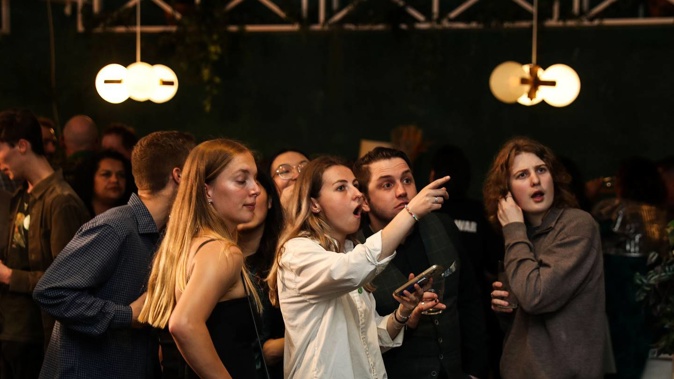

The Green Party could come close to its highest-ever election result, but co-leader James Shaw has acknowledged that Labour’s poor showing means “the first Green Government is drawing to a close”.
In one of the biggest upsets of the election, the party’s candidate Tamatha Paul is well ahead in Wellington Central.
Chloe Swarbrick has a strong lead in Auckland Central, the seat she won last election.
The Greens’ influence will be in opposition, and their preliminary party vote result - at about 10.5 per cent - is below recent polls.
However, the mood at their election night party on Auckland’s waterfront was celebratory.
“Your work has delivered a Green Party campaign that has once again defied history,” co-leader Marama Davidson told the crowd.
“People were calling Wellington Central a Labour stronghold.”
The crowd went quiet when Shaw spoke about National’s likely victory.
”It does seem all but certain that the first Green Government is drawing to a close,” he said.
”Our friends in the Labour Party are having a very tough time. A lot of good people will not return to Parliament next week.”
Swarbrick struck a victorious tone in her speech.
“We did this!” she shouted to the crowd. “This is what people power looks like.”
The Greens have around 10.5 per cent of the preliminary votes, which equates to 13 seats. Special votes are still to be counted.
The Greens’ previous best result was 11 per cent of the vote in the 2011 election (14 seats).
Paul is well ahead in Wellington Central, with thousands more votes than her nearest rival Ibrahim Omer.
“No matter what government we get, we will be a pain in their a**,” she told supporters in Wellington.
”Thank you for believing in this Māori girl from Tokoroa.”
Swarbrick has a comfortable lead over National candidate Mahesh Muralidhar in Auckland Central.
Julie Anne Genter has edged ahead in Rongotai, but the contest is close.
Speaking to media in Auckland, Greens co-leader Shaw said it was too early to think about his party’s approach in Opposition and whether it would seek a formal agreement with National to prioritise areas of common ground - as it did under the John Key-led Government.
He noted that the Greens would have a larger presence and mandate, with 13 MPs.
”Obviously we would have preferred to be in Government… but we think we have left a legacy for others to build on,” he said, citing significant areas of environmental reform including the Carbon Zero Act.
Asked whether he was disappointed in Labour’s campaign, Shaw declined to directly criticise Greens’ governing partners.
”Their campaign is for them to analyse. We ran a really strong campaign.”
Green MP Golriz Ghahraman, speaking to the Herald at the party’s Auckland event, said the election results so far were a lesson for Labour.
”They had a historic opportunity to do right by progressive voters. So I think the lesson here is to be bold and courageous and to stand for systems change. Otherwise voters may lose hope.”
Faced with the prospect of Opposition, Ghahraman - who will be returned to Parliament - said her party would be disappointed to lose its work programme on climate change and domestic and sexual violence.
”But we will work really hard in opposition to represent the issues the Green Party stands for - whether that is inequality and reform of the tax system or climate change.”
The party’s relatively strong performance in electorates “show that communities want the Green Party to be representing them in particular”, she said, adding “That’s beautiful.”
The Greens had a relatively low-profile election campaign, overshadowed by the National-Labour stoush and jostling for position by Act and NZ First. But the party steadily grew its vote from around June, when it got a jump on its rivals by releasing comprehensive policies earlier than usual.
A turning point arrived when Labour ruled out significant tax reform in July. Campaigning on a wealth tax, the Greens appeared to get a boost as Labour’s support dived.
The wealth tax of 2.5 per cent on assets over $2 million, and a higher corporate tax rate of 33 per cent, would pay for a suite of policies, including an income guarantee of $385 a week and free dental care.
In all, the Greens had seven key policy planks - along with the wealth tax, they promised an overhaul of welfare, a plan to end homelessness, reduce emissions and improve housing and energy use, and provide universal dental care and better marine protections, among other policies.
The party avoided minor and major scandals of previous elections, though it had a blip before the campaign began when MP Elizabeth Kerekere resigned amid accusations of bullying.
The Greens’ pitch was to offer hope in a “bleak” election. While Labour and National hovered near the centre, the party tried to offer something different. It stressed that all issues - from reducing emissions to ending poverty - were political choices.
Constrained by less funding than other parties, the Greens ran a more targeted campaign, focusing their energy on fewer, mostly urban locations.
The party still managed a large ground campaign, recruiting a record number of volunteers and exceeding its door knocks and phone calls from 2020 with a week left in the campaign. This was heavily influenced by Chloe Swarbrick’s unlikely electorate victory in 2020.
Take your Radio, Podcasts and Music with you








